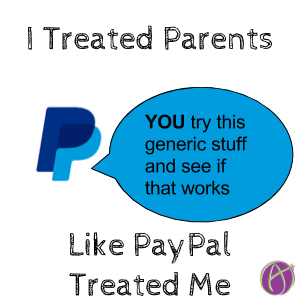I Treated Parents Like PayPal Treated Me
I have been having a frustrating exchange with PayPal. I am trying to pay a legitimate invoice sent to me by a programmer I work with in Russia. While the error message only said “We’re sorry, but we can’t send your payment right now” I figured it had something to do trying to send a payment to another country. I explained this when contacting PayPal hoping they could clear whatever block they had since I was letting them know it was legit.

Rather than listen to my specific issue what I got was generic solutions for tech not working. I was told to delete the cache and cookies on my computer AND delete the app and reinstall it on my phone. These are 2 different devices and one of those “problems” would not affect the other. They are guessing and providing generic solutions. I tested the theory by trying to pay on different computers, different browsers as well as my phone. I tried paying other people; I can pay other people. I tried paying my person in multiple ways where I sent him money. I did this from multiple computers and browsers.
Contacting PayPal again I was told the person I was paying had no issues and was a good customer. They were having problems with the system and hope to have it working again in 48 hours. I don’t think their system glitch is the issue, I am able to pay other people. I am frustrated with the generic solutions that require ME to jump through multiple hoops that really are not specific to my issue.
Listen or Explain
This got me to thinking about how I listened to parents when they would contact me. My first line of defense is to explain how I do my lessons and assignments.
I would EXPLAIN instead of listen.
I would then give some generic suggestion that the student “do their homework” or “come to the after school lab.” This does not address if my lesson was poorly delivered, I never offered that as a suggested reason for the student struggling. Obviously, no single approach works for every student so it should not be shocking that some students were not connecting.
Eventually, I got to a realization that when a parent called, what they were calling about was not really what they were upset about. This was just the excuse they had to contact me. Bottom line, something is not working for their kid. Me explaining how class works does not fix anything. They are seeing their child frustrated, crying, hating school. They do not know how to help or necessarily communicate what is wrong. They just know something is wrong.
Step Back
Once I learned to take a step back and not be defensive when a parent contacted me, interactions with parents got a lot better. Instead of explaining things or giving a generic solution I tried to acknowledge that the child is struggling and just listen. I asked the parent what they thought would help. I would try to identify what things were frustrating and acknowledge them. I’m not perfect for sure, sometimes I did do some things that maybe I could have done better or taught better. Validation, an apology, and an attempt to make things right go a long way.
Unlike PayPal’s solution which was to just use a different company to do my business because their system was not working, our students usually can not go somewhere else.
Fair is Not Equal
Every student is a unique individual. “That would not be fair to the other students” does not take into account that what everyone is getting is not working for that student.
Since I do not have copyright permissions to the popular image of 3 students standing behind a fence you can link to it on Google Images. In the image you have 3 children. A tall child, a medium height child, and a short child. The tall child can already see over the fence. The middle height student needs one box to see over the fence and the short child needs 2 boxes.
PayPal treated me like I was any customer. It felt like they were reading generic solutions to me off a paper rather than listening to my unique situation. I told them up front that I was trying to pay someone in Russia and that that might be why the payment is not going through. No one would bother to check if there was a security block and to work on how to safely pay someone in Russia. This piece of information was completely ignored as I was told to have him send the invoice a 3rd time.
I have been guilty of doing this to parents. I ignored the information they told me since my response was defensive. I provided generic solutions that the parent knew probably was not the trick for their child. The parent not calling back is not necessarily a sign that everything worked out; sometimes it is a sign that they didn’t feel it was helpful.
My Tips for Talking With Parents
- Listen
- Instead of responding with an explanation, try not to be defensive. Take a breath.
- Try saying to the parent “I am hearing you that something is not working for your child. What are some things that he/she found frustrating so far this year?”
- Don’t be afraid to admit that you’re not perfect. “You’re right, I can see how that frustrated your child. I could have handled that better.”
- Try to solicit some ideas from the parent. This can be a good starting point for strategizing a solution with the parent. Let them go first, they have had the child’s entire lifetime to experience what tricks do and do not work for their child. They also have seen in other classes some things that did or did not work for their child.
- Build on this and come up with something that helps the parent to feel you came up with a strategy together. This will help the parent to be more willing to continue the conversation if the child continues to struggle.
- Schedule a time to reconnect and follow up.










7 thoughts on “I Treated Parents Like PayPal Treated Me”
Thanks for sharing this. Trying to look at things from a different point of view is often hard to do, but it is so worth the effort.
I’m not sure if this is your best post yet, or if it’s just what I needed. Thanks!
Thanks Tracy! It’s important to remember to step back and listen. It’s hard!
Thank you for reminding me with your excelent suggestions.
Such an poignant post! Reflection is super hard for almost everyone, but it is necessary if we are to continue to grow and improve. Thank you for being so candid!
Often with parents we feel the need to be “the expert.” Often with parents they are “the expert” on their child. Need to remember that.
Great way to put it Tom!